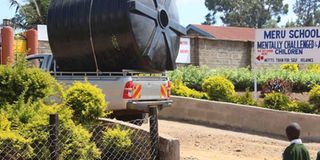Two pupils die after E-coli outbreak at Meru School for Mentally Challenged

A pick-up truck delivers a water tank to the Meru School for the Mentally Challenged and Autism children on May 31, 2016. Two pupils from the school died after an outbreak of E-coli. PHOTO | KENNEDY KIMANTHI | NATION MEDIA GROUP
What you need to know:
- Close to 50 pupils with severe abdominal cramps and diarrhoea were admitted to hospital.
- Meru Health executive William Muraah said the students did not die of cholera as had earlier been reported.
- Public Health director Ephantus Kariuki said the source of the outbreak remained unknown.
- Many schools in Meru lack proper toilet facilities, a situation that could easily lead to the outbreak of waterborne diseases.
An outbreak of E-coli (disease-causing bacteria that normally live in the intestines) has claimed the lives of two pupils at the Meru School for the Mentally Challenged and Autism children, with several others being admitted to hospital.
The school has been quarantined with medical workers camping there to monitor those under medication and prevent the spread of the bacteria.
Close to 50 pupils with severe abdominal cramps and diarrhoea were admitted to hospital but by Tuesday, only 10 were still undergoing treatment.
Meru Health executive William Muraah said the students did not die of cholera as had earlier been reported, adding that food and water contamination could have been the cause of the outbreak.
“Only a conclusive culture test can reveal whether it is cholera. Test results say the students died of E-coli.
“We have about three students who have mumps infection but we have dispatched personnel and medicine to the school,” he said.
WATER CUT OFF
The school had its water supply cut off some months ago due to unpaid bills, according to Dr Muraah.
“We have purchased enough water treatment tablets and distributed them to the school,” he said.
Public Health director Ephantus Kariuki said although the source of the outbreak remained unknown, the infections could be attributed to two students who had travelled from North Eastern Kenya after the school holidays.
“All staff and workers have undergone tests and we have embarked on visits to educate them on better sanitation,” Mr Kariuki said.
Dr Muraah, however, added that many schools lack proper toilet facilities, a situation that could easily lead to the outbreak of waterborne diseases.
NO TOILETS
“This has led to open defecation and the result has been diarrhoea when water and food is contaminated,” he said.
County public officials have been arresting owners of houses and business without toilets.
About 46,000 households in Meru do not have toilets.
This accounts for 15 per cent of the households in the county.
According to a survey conducted by the Ministry of Health, Water and Sanitation and the World Bank in March 2014, Meru was ranked 43rd out of the 47 counties in sanitation.
Last week, Meru Governor Peter Munya said counties have partnered with Unicef to improve hygiene in schools under the health, water, sanitation and hygiene (Wash) programme.





